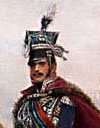 |
| Edward Fox as the Colonel from The Duellists 1977 |
A second section of the community was equally disgruntled -- the ex-soldiers. The victorious powers had insisted that the French forces be reduced to a shadow of their former size, and large-scale demobilization was in any case economically imperative. Pitchforked into civil life, the French rank and file grumbled - as always - but this time with real grievances. One hundred and fifty-five years earlier Cromwell's New Model Army had similarly been abruptly disbanded by another restored monarchy, and contemporary observers had been greatly impressed by the orderly way in which the original redcoats had re-assimilated themselves into civil life. The France of 1815 was not, however, blessed with so easy a transition. No doubt many of the conscripts were only too gladto revert to their former ways of life, but there remained a hard core of veteran soldiers who proved incapable of finding a place in the inflationary economy and shaken society of defeated France. Many starved; all felt disgruntled. The focal points of the old comrades discontent were the cafes where the 12,000 or so officers on half pay would congregate to read the Paris news sheets, sip a pernod, and lament the "good old days" of teh Empire. The passage of time rapidly glossed over the realities of Napoleonic campaigning - the fear, the fatigue, the mud, the hunger and pain - and left only the evocative memories of la gloire and treasured remembrances of some passing word from Le Tondu. In this way, the Bourbon policy of military retrenchment ensured that the Napoleonic mystique survived. Somewhat paradoxically, this was nowhere more evident than within the ranks of teh units incorporated into the new Royal army. No amount of ordinances and disciplinary awards could check, for instance, the established practice of sentries presenting arms to veterans wearing the white enameled cross of the Legion d'Honneur. In the end this was allowed.
~ The Campaigns of Napoleon, D. Chandler, p. 1010

















.jfif)



































3 comments:
That is an excellent book, by the way - a rattling good read, even read as a story (which it is, of course). Unlike probably most anglophones, I have become something of an admirer of Napoleon Bonaparte for his very real abilities and energy. Right now it is my belief that this world stands badly in need of a Napoleon - someone with his head screwed on the right way: with the intelligence correctly to identify problems, the ability to find effective solutions, the will to carry them out, and the fortitude to override vested interest. That is, the complete antithesis of the brainless, spineless, gutless, heartless twonks presently running the planet.
Happy New Year, Dude!
Cheers,
Ion
Nice extract from Chandler's fine 'tome' David!
I have always had an admiration for the brilliant talent that was Napoleon Bonaparte, such a person will always emerge from the boiling cauldron that is revolution.
There can be no doubt that he was a military dictator. He was aware of the constant threat to life and limb that existed in his world - this paranoia may have been what sent him over the top when dealing with the royalists and jacobins in the early years of his rise and what likely drove him to ruin in the later years of his life (carried a vial of poison from 1812 onward and used it - or part of it - in 1813).
When studying such a person, one is left with the question, "How long can one man hold the world on his shoulders?"
Post a Comment